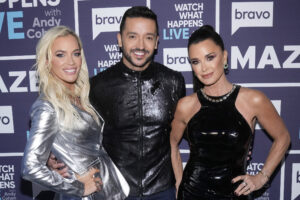How do you memorize a long monologue? “The first thing is you have to clearly understand each scene — the goal and the obstacles, and what you need to do to obtain the goal. When it comes to learning the monologue, what comes first to me is what is the character going after. And then, of course, to whom I’m speaking. There are tricks like grouping the ideas together, but if you have an understanding of the emotional connection to the person you’re talking to, the words fall into place.”
What do you do if your scene partner doesn’t feed you a cue you’re expecting or forgets a line? How do you recover from that to keep the scene going? “I usually am able to nip and tuck, but if it is critical, I will pause and wait in what may seem like an eternity but in reality it is milliseconds. It happens to everybody. How can you not when you are memorizing 30 pages of dialogue? But you just start again.”
How do you break down a complicated script? “It goes into goal, obstacle and action. There are things you want ahead of time, and it is about goals, obstacles and action. You want a listening moment before to set it up, but it is about being as connected to the other actor as you can be while allowing things to unfold moment to moment. You have to remain open to the infinite possibilities that can emerge from a scene.”
How do you deal with crying scenes? “It’s about an emotional recall, and there are physical tricks, too. One of the best ways it was described to me is you imagine someone is pouring a pitcher of water on the back of your throat. Your throat begins to tighten. It constricts. Your eyes tend to water. But I find is the best way is to be a good listener. I should be able to get what I need from them in a scene. There are actor techniques, but there is nothing when there are no tools to use. Sometimes you get lucky in the moment with your scene partner and that’s what works.”
How do you approach playing drunk? “When you are playing drunk and you are crying, you are trying not to cry and are pretending to be sober when you are physically not. It is the struggle to overcome that facilitates.”
How do you prepare for a love scene? “Not eating for 24 hours before [laughs]. Again, it is about creating a connection. You want there to be danger and passion and everything that will heighten the sexuality but it is so important that your scene partner feels safe with you. The safety issue needs to be [addressed]. There are technical parameters with camera and lighting that you have to adhere to, but you have to keep all of that in your head and just let it go. It is all about being professional. I want to make it fun and sexy but it really is all about what the crew needs to get. There are so many components involved.”
How do you approach playing the dramatic tag at the end of a scene? “That is the nature of the beast. Knowing the tag is an extended look, which is longer than it would be in real life, what I will do as run-through [rehearsal] is a rapid succession of non-verbal looks. I know the editing room, and I know they will have what they need and what they choose. I did two PERRY MASON things with Raymond Burr, and he would have volumes of legal dialogue to cite and he told me, ‘Think about your grocery list.’ You can deceive the camera in terms of what you are thinking about and connect to it. Look engaged, and that will influence the audience. Acting is not waiting for your cue from your scene partner. You have to stay connected and convey emotion, often without words.”
What do you do when you get the giggles during taping? “That happens! I love to laugh, but usually we will laugh it out for a second and then look away from each other. It comes down to changing your state to quickly and effectively get out of that state. Walk into a corner. Talk to yourself. Whatever you need to do. But I have to say when you are doing something heavy and emotional, sometimes it is good to have a laugh to relieve the tension.”
How do you handle shooting scenes out of order? “That comes down to knowing what your preceding circumstances are. It is not [my preferred way to work] but it is a part of acting. Whenever it is TV or a movie, you are always shooting out of sequence. You need to know where you are emotionally. Keep in mind if you were crying beforehand, if your eyes are puffy and red. You need to remember the moment and keep the sequence in check.”
How do you handle a scene partner who ad-libs? “I worked with the great Darlene Conley [ex-Sally]. I never ad-libbed when I got on the show, and thank God I have such a group of writers and producers and actors now when it comes up. I will never forget the first scene I had with Darlene and I looked offstage and they were like, ‘We’ll fix it in post.’ She would just go off, but now I believe one of the greatest attributes an actor can have is to nip and tuck to convey what the writers conveyed, but every now and then, you have to put in your own emotional voice just to hit those notes. I respect our incredible writers and usually I will clear it before and during rehearsal. The actors have to be aware of it. I specifically try to not change the last line, which is the other actor’s cue. That’s kind of disrespectful.”







